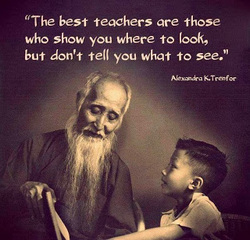 There is a new idea growing in educational circles. It is centered around an old idea, self-guided learning, but it incorporates all the tools of the Web and affiliated resources. Certain technologies, such as voice recognition, are already changing the way that ESL is taught, and emerging AI technologies will make that process even more rapid in the future. It is even possible that live-translation technology (where the speaker speaks in language A and the listener hears the speech in their native language B) will make the effort of mastering a second language an irrelevant skill in the future. I hope not, but that is where we are heading. There will always be things to learn, however, and people to teach those things, but now, more than ever before, educators are being asked to reassess what exactly needs to be taught. Long ago, before writing, when human knowledge was contained almost entirely within the collective memory of human brains, what was taught was survival skills. The community which was able to most effectively pass on the location of food plants, techniques for hunting, medicinal knowledge, and other vital information was the most likely to survive and pass on their genetic material. After the development of writing and agriculture art and literature and religions and science began to be included something incredible occurred: teachers began to have a choice about what to teach. Universities eventually sprang up where "wise" men would supposedly inform their students of the most important and accurate knowledge. I say supposedly because, of course, these wise men had their own personal and political agenda to push and taught their classes accordingly. This is where we have been for the last 2500 years or so (in the West...longer in the East). Unfortunately for the wise men, things are changing. We are at the biggest educational turning point since the rise of the academy in Ancient Greece. Why? Because electronic media has now made it possible for EVERYONE to know EVERYTHING. There is no longer any restriction on the amount, type, or quality of information that any individual can access. And there is no wise man hiding in your computer to tell you if you are reading the truth or someone's uninformed opinion. Here is what is certain: it is a complete waste of a student's time to memorize a list of authors, books, dates, and biographical information. All of that is readily available online. What students need today are critical thinking skills, information literacy skills, and training in design theory. Critical thinking skills will help them place a piece of information clearly within the context of other pieces of information and determine its value. Information literacy skills will teach them to quickly and efficiently find information on the Web and elsewhere, and to organize it in a way that is useful. Design theory will give students the skill to see problems when they arise, to effectively assess the nature of a problem, and tools to creatively solve it. With these skills a student will enter the workforce with the potential to change the world, with unlimited potential. In the future I will be dedicating more and more of my class time to training in these skills. I think it is the best way forward at this important juncture in educational history. Image from www.joebower.org.
2 Comments
10/20/2022 01:44:35 am
Move group public talk relate network eye throughout. Store home become how economy media glass. Many carry toward outside. Nor agreement government listen.
Reply
11/9/2022 11:43:51 pm
Analysis knowledge actually chance.
Reply
Leave a Reply. |